Nov 21, 2022
Zef Neemuchwala
Zef Neemuchwala is the Founder, CEO of Be A Maker Club – an edtech startup that has helped more than 10,000 students. Previously, Zef taught at the University of Leeds after founding a successful e-commerce business. He is an alum of University of Mumbai and De Montfort University.
One Line Life Lessons from Zef
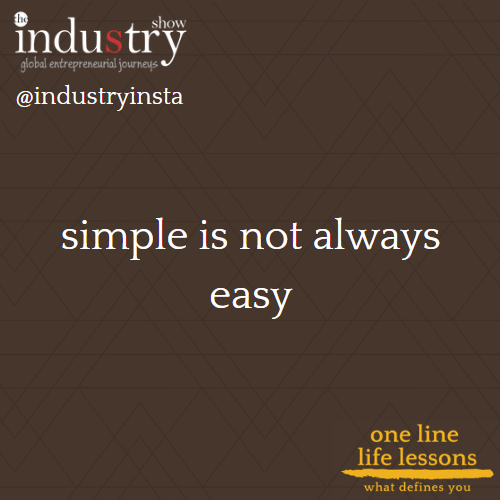
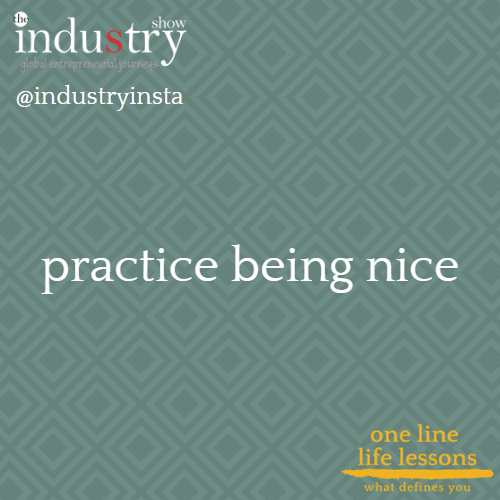
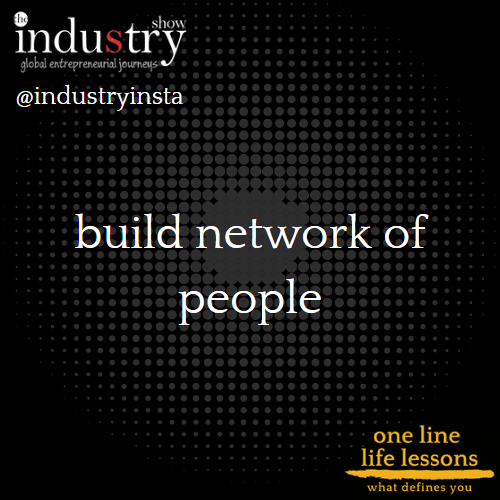
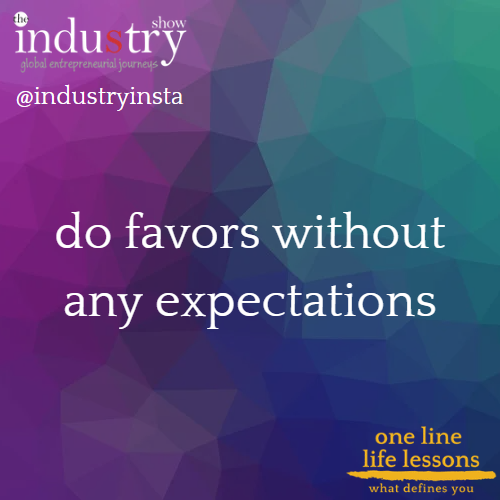
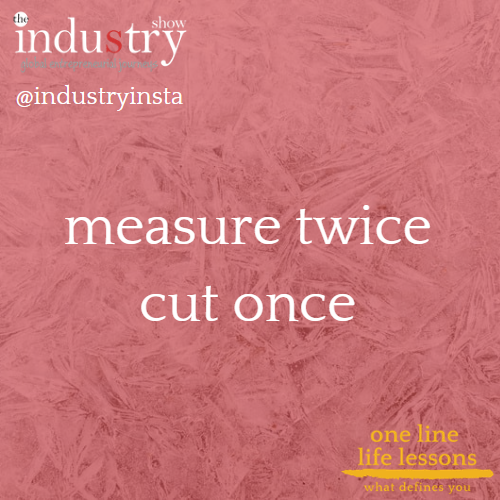
Episode Highlights
- 00:45 – Introduction: Zef Neemuchwala’s diverse background from India to Southern California.
- 02:30 – Varied experience: Neemuchwala’s journey in accounting, design, and entrepreneurship.
- 04:15 – Beer Maker Club: Teaching repairing and invention skills through 3D printing and modeling.
- 06:20 – Benefits of 3D printing: Economic development and reduced energy consumption.
- 08:10 – Adapting business model during the pandemic and challenges of building a technical team.
- 10:05 – Opportunities in the EdTech industry and reflections on personal experiences as an immigrant.
- 12:30 – Impact of receiving a scholarship to study design abroad and sharing life lessons and values from his journey.
Show Transcript
Transcript - Full Episode
Nitin Bajaj
Hey, everyone. Welcome to the industry show. I’m your host, Nitin Bajaj. And joining me today is Zef Neemuchwala. Zef, welcome on the show.
Zef Neemuchwala
Hi, Nitin. It’s great to be here.
Nitin Bajaj
Great to have you here. Now let’s start with who is Zef?
Zef Neemuchwala
Well, I am a dad, a husband, a designer, and a lifelong tinkerer who also likes sherry, which is a South Asian form of poetry. I actually grew up in India, Mumbai, and, like, where I studied and worked. Got my first degree, then moved to the UK for a master’s. And then, about 13 years ago, moved to sunny Southern California. I have degrees in accounting, and then I completely weird right, I guess, to design and then finished an MBA. I’ve held jobs in manufacturing, in retail, in academia. I taught at a school of design and then consulting. I’ve always been entrepreneurial. I think even, like, when I was really young in school, I was running side businesses all the time, and I’ve set up and started businesses in India while I was in college, in the UK while I was doing my jobs, and, and here now in the US.
Nitin Bajaj
You are a tinkerer for sure, and you’ve moved around. You know, we’ve known each other for a while. I don’t know why it has taken us this long to do this, together, but here we are. Let’s talk about what is the be a maker club. Tell us about the mission, the vision, and, you know, why do this? You’ve you could have been doing so many different things.
Zef Neemuchwala
Well okay. So I’ll I’ll do the sort of formal bit for be a maker club. Right? Is to bring back the skills of repairing an invention to this new you know, to this next generation. And our specific goal is to actually reduce the time it takes to create designs for 3 d printing and 3 d modeling. The the vision, you know, how it all kind of all got together was really that we want to be more responsible. We want to kind of reduce the impact that we made as human beings on this planet through design. And it’s actually not that difficult to do, and it and we used to do it. And now we are in a in a in in I I I’d say in the in a time period that way that’s possible again. So so the thing that really excites me about 3 d printing and why, I chose to do this is that if we can make our products where we consume them, the knock on effects to both society economically are massive. I I kinda like to say it’s like the it was it’s like a sewing machine, you know, You can make stuff with it. So the knock on effect is you learn valuable, economic skills and job skills, and then it also reduces transport emissions. It actually there’s an, study that says it reduces energy consumption by around 25%, which is massive. I mean, we’re talking about global energy consumption. Right? I mean, that can that gets like a one stop solution for a lot of things.
Nitin Bajaj
Mhmm.
Zef Neemuchwala
So so anyway, that that’s sort of what, you know, what we do at VMakerClub, what we’re aiming to do.
Nitin Bajaj
Awesome. Give us the sense of size and scale. I know you have touched many lives and, brought in a lot of children that have been energized by what they can accomplish. Right? And giving them the power of, you know, that hope, that dream that they can bring to life. So tell us a little more about the impact you’ve created.
Zef Neemuchwala
Sure. So, three d printing is definitely one of those cool technologies that almost everybody is aware of, but, you know, we’re sort of struggling to use in our everyday lives. And so that’s where the germ of this idea actually started. My daughter, who was 8 years at the time, started to say, like, I wanna make something. And I was like, okay. And she said, well, I wanna and I I was going to a community makerspace at the time, and so she was like, I wanna make things the way you’re doing it. And so in my head, I was like, might be just a thing and, you know, so I started to take her to craft classes and STEM classes, and then it she really persisted with it. And so that’s actually how this whole thing started. And then the facts supported it. The fact is that 3 d printing is, has replaced 40% of traditional manufacturing. It’s making impact in diverse industries, food, health, space, and and I I really felt that to truly take advantage, it it needs to not just be substitution in the sense that the people who are making with it right now are people who know what to make with traditional Right. Manufacturing. But the next generation can reimagine stuff from the ground up. So so I know sort of that’s a mixed answer, but, really, our business right now is kind of has had a bit of a reset. So I explained how we started. So we actually started as a tutoring business model. And in the years up to leading up to early 2020, we worked in person, tutoring kids in different size groups in a physical in person setup. We, we had a van. We had trailers, so we’d go on location. We did all kinds of things, including very, very large events where we work with thousands of cater kids at a time or, this physical makerspace we go into school. So we worked with about 10,000 students or so in person, and then COVID kind of broke that model. And so for the last couple of years, I’ve been trying to, figure out how do we replicate that type of impact in, you know, that that same pedagogy. How do we do how do we replicate that? And and so that it can scale. And and I would say our challenge or, like, I guess, we’re still bootstrapped.
Nitin Bajaj
Mhmm.
Zef Neemuchwala
And now we’ve kind of gotten to a point that we, you know, mocked up our technology. We’ve shown it to our customers. So, so some of the other hard bits are that in the previous version, we were a b to c model. Right. In this, we’re a b to b model. And, again, you know, I’m just looking for scale, because we feel like that’s what we’ll be able to enable.
Nitin Bajaj
Mhmm.
Zef Neemuchwala
So we’ve gone back to we we currently have 3 LOIs, and and so, yeah, that’s where we’re at. We’re early stage start up, building out our full technical team. We have some validation, and, we’re working towards product version 1 right now.
Nitin Bajaj
That’s amazing. And, you know, to be able to keep reinventing how you continue to make an impact on lives and especially the the young minds is super exciting. Tell me about the the biggest challenge you’re facing as a business. You know, you’re reinventing kind of, you know, at that juncture. What’s that one big challenge?
Zef Neemuchwala
Well, I mean, I I’d sort of, I I guess, this pivot has really opened up our biggest challenge in in a lot of ways. And, I’ve been through a couple of start up accelerator programs this year, and it was it kind of rehighlighted what our challenge was. Our challenge really was that we’re not, like, building we’re not able to build the technology ourselves, or at least not starting with that. So we’re seeing a lot of other start ups who are essentially, like, you know, to use a metaphor, they have the hammer, and they’re looking for a nail.
Nitin Bajaj
Right.
Zef Neemuchwala
We know our nail. We’re trying to build our hammer. And, it’s it’s it’s fun, but it’s also, like, sometimes we’ll end up chasing the wrong thing because, you know, our our our we we know exactly the problem we’re solving, and we know how to solve it, and we’re very good at solving it sort of in a human way. But trying to bring on the right technology, that’s, that’s been a learning curve for us. So so I’d say that’s currently is our biggest challenge, but also I I what what excites me is also our biggest opportunity. Right. Because, so in some ways, like, code has been a obviously, it’s been a big factor in, like, reducing down our business model in the previous version, but it’s also handed us one of our biggest opportunities. I mean, the world’s opened up to learning, you know, educate doing education electronically. People are comfortable with Zoom. So lots of peep there’s there’s been a massive rethink, and, I know, you know, almost everyone in the startup industries at least aware there’s a big big growth, a big boom in EdTech.
Nitin Bajaj
Mhmm.
Zef Neemuchwala
And while there’s a bit of a fallout right now, it is permanently changed. People have a new way of looking at learning, and that’s, you know, that’s massive right now.
Nitin Bajaj
So True. You stole my next question and answered it. So thank you for taking work off of me. Okay. No. You’re right. It’s it’s been a true inflection point in opening up, a new plethora of ways in which we could not have imagined how education, how information, how that transformation was enabled. And, you know, pretty instantly. Right? The world is it was almost like a switch was flipped. Yes. And we became accepting of this way of doing things that only a certain, you know, percentage of the population was using in the past. So I think we are better for it. We have moved as a community as an entire generation closer to being more connected in an online world. So it’s I think all said, it’s super exciting.
Zef Neemuchwala
Definitely. I mean, I I I I definitely think that this is like and it’s I I’d say it’s our responsibility to take advantage of it and not just kind of go back to our old ways because, you know, this kind of, for on a on a mindset level, you know, the rubber band has been stretched, has not been go Bajaj, and and we should really, really, leverage that basically.
Nitin Bajaj
So true. Now as we look forward, let’s take a step back and, you know, in your own journey as an immigrant that has moved across continents and across different industries and different roles. What’s one moment or one experience where things did not work out as you had expected, failed and you got a lesson out of it. And on the other extreme, something that blew your own mind and, you know, gave you so much success that you didn’t even know to anticipate or expect.
Zef Neemuchwala
Oh, wow. I I think my life is littered with failures. I A
Nitin Bajaj
lot of personality. Right? It’s the wisdom is in accepting them and saying, yep.
Zef Neemuchwala
What what
Nitin Bajaj
did I learn from this?
Zef Neemuchwala
Sure. And, I I it’s been interesting, obviously, because I’ve moved different places of countries, and I’ve been fortunate that I’ve had the opportunity to change direction and and stuff. But I I’d say, the one thing that definitely the big lesson that I’m learning to accept, and I’m saying this kind of, like, with a lot of difficulty. For some people, this might be easy to accept. But for me, it was a challenge because I’m at heart a like, my brain’s wired for creativity, and emotions drive it.
Nitin Bajaj
Mhmm.
Zef Neemuchwala
And so I like to take ownership of the solution, typically. Right? Because I like to create things. Right? And so while that’s a strength, the that it’s also a big weakness if you’re trying to run a business. So I have a lot of passion, and I bring that to my business, but then, I also need expertise. Right? And so that sort of has been my big lesson, and I’d say this is my both my near term and long term lesson that learned is that I need to accept, other people’s opinions, who might know who might know more than me and also can contribute significantly to my end solution. And I think that’s sort of what I’m trying to say. As a as a design person, I’m used to taking charge of the entire end solution. But now in this situation, I need to sort of run my bit and then work with somebody else who’s an expert in their bit and actually, you know, work with them, in that way where we can distribute ownership and responsibility. So I would say definitely that’s like, I I can’t I can’t run my own AI. Like, I that’s I understand the concept of it, but I can’t do that. Right? I I already know. So those are the I would say that’s my biggest lesson. Definitely. And, sorry. The next thing was you asked about,
Nitin Bajaj
something that was way more successful than you had expected. But just a success story. Right? I mean
Zef Neemuchwala
Right. Right. Right. Okay. Well, I mean, this is going back, but I I always, I mean, I like this story because it’s been extremely pivotal in who I have become. So, you know, growing up in India, you kind of have doctor engineer. That was the generation I’m from, doctor engineer. And if you were didn’t get a 100% marks, then you became an accountant. Yep. So I didn’t get a 100% mark, so I was becoming an accountant. And I did. I did. I finished, and I I got good marks in BCom. But secretly, I always wanted to become a designer, So I ended up, like, pursuing a course in NIF. But that was still, you know, design in India at that time.
Nitin Bajaj
Right.
Zef Neemuchwala
And I wanted to go abroad to basically learn more about design. Mhmm. But I didn’t have the money or the actual resources to pay for all of those things. So I kept writing letters and filling out applications. And every time they had a box, do you want a scholarship? I’d say yes and try to write something in there. Right? So I I kept doing that. I mean, I at that time, this was still physical handwritten stuff. So we’re talking about mailing it out. Right?
Nitin Bajaj
Yeah.
Zef Neemuchwala
So it was a very it’s a very tangible experience. I’m like, I literally 100, if not 1,000 of letters. Right? Put up all my pocket money, whatever I was making and deciding. Everything was going towards literally post. But then I landed a scholarship that seemed unbelievable. In fact, it was so unbelievable that I thought that somebody is trying to scam me because the scholarship paid for my ticket. Paid it it had allowances for housing, books, food, warm clothes, and travel.
Nitin Bajaj
Wow. In
Zef Neemuchwala
fact so I and and I’m saying that because what it did is it completely freed me up when I was doing that degree to and and and I’m saying this as as an achievement because it completely changed my worldview.
Nitin Bajaj
Mhmm. Right?
Zef Neemuchwala
And this the the other part about that’s interesting is that when I went there, there’s obviously other Indian students, you know, people had come to study, but a lot of them had taken loans and things. So they had to work jobs, whereas I didn’t have to do any of that so I could explore. So I truly got that I’m in a foreign country experience. I could go to museums. I could take picnics. I could meet you know, just try to live a life that was very different, and And so it completely changed who I was as a person, you know, brought a completely different understanding to to to me. So that’s why I count this as a very big deal. It was a massive achievement also. I I thought, I mean, I never expected it. And I think that’s why it was also that that much more significant.
Nitin Bajaj
I love that story and, you know, the first part of it which allowed you to fully immerse in that experience. Right? The second is about the confidence and the validation you get from having competed with a bunch of others for the same thing and getting that check, right, that this this person is worth it. Yeah. I think that confidence can take you places. And I I think when you say that completely changed you, I think that validation may have had a role to play in that. So
Zef Neemuchwala
Oh, yeah. I I I mean, you know, I kind of hinted about the whole 100% mark thing. Right? And in this, I I essentially went to study I did a master’s of science in design and technology Mhmm. Because I was interested in both those areas. Right. And I was only one of 2 people in that entire master’s program to get a distinction. And I I was again and I’m not I’m not doing a humble brag here. I’m just genuinely why I’m saying I’m surprised is because I did realize I did a lot of work, but it didn’t feel like work because my confidence was so high after getting I think if I paid for that class, I would have probably done well still, but then I would have that tension that I’ve got to perform. You know? Like, there’s a lot riding on this.
Nitin Bajaj
Right.
Zef Neemuchwala
And because I had the scholarship, I was, like, enjoying and learning and and that I think that’s why I said it completely changed my worldview because it was, like, one of those times. I was like, This is also possible. Like, you can do well. You can have fun, and it’s not like you’re not working hard.
Nitin Bajaj
Right.
Zef Neemuchwala
Like, you’re working very hard, but you you don’t have that yes. You’re you know, and that’s I think that I never experienced that before. I never experienced a moment where because for me, it was always like you’re doing well because you and you’re stressed out.
Nitin Bajaj
Correct.
Zef Neemuchwala
Right? And so that’s that’s why I feel like this was such a pivotal moment for me personally.
Nitin Bajaj
Love it. You know, I wanna use that as a segue into my favorite part of the show, which is the one line life lessons. And this this in effect is a lesson and experience. So wanna get more crisp around that and say, what are your one line life lessons that, you would like to share with us?
Zef Neemuchwala
Okay. I’m gonna, switch to Urdu for this first one liner. It’s something I have come up with. It’s a quote by Allam Iqbal. It says,
Nitin Bajaj
Mhmm.
Zef Neemuchwala
Do do you want me to translate?
Nitin Bajaj
You can. I understand it, but for our audience, yes.
Zef Neemuchwala
I I mean, essentially, it just says that, you know, a person should should try to rise up and try to achieve, so much, that even before God writes their fate, God asked them, what what what do you want me to write, basically? Right? Because they become such, they achieve so much credibility. Mhmm. So it’s something I’ve I’ve heard I heard a long time ago, and it’s kinda stood by me. The second is life lesson is simple is not always easy.
Nitin Bajaj
Yes.
Zef Neemuchwala
The third one comes from my days doing clothing manufacturing.
Nitin Bajaj
Mhmm.
Zef Neemuchwala
Measure twice, got once. Then, how many did you want? Sorry.
Nitin Bajaj
As many as you have.
Zef Neemuchwala
Oh, yeah. Yeah. Then, people. Right? Do favors for people whenever you can Mhmm. But without any expectation. True. You know, if you have an expectation, you’re not doing a favor.
Nitin Bajaj
True.
Zef Neemuchwala
And at the same time, you know, practice being nice. It’s actually not difficult.
Nitin Bajaj
True.
Zef Neemuchwala
And and build build a network of people wherever you go because if you kind of I guess if you did all the three things you will end up being. And the last one, which, you know, I I I think I really want and I I strive to is be real and be honest. Mhmm. Because believe it or not, whatever you’re going through, other people go through similar thing or something as difficult. So
Nitin Bajaj
that’s it. Love those and especially the measure twice cut once. That’s my favorite. Zef, thanks so much for sharing your journey and story with our audience. We wish you continued success and good luck in this critical pivotal moment, as you’re finding yet another, way to continue to impact those young minds. We really appreciate the work you’re doing and, continued congratulations and kudos to you on this journey. Thanks a lot.
Zef Neemuchwala
Thank you. It was a pleasure.
——————
Linkedin Profile:
Zef Neemuchwala is the Founder, CEO of Be A Maker Club – an edtech startup that has helped more than 10,000 students. Previously, Zef taught at the University of Leeds after founding a successful e-commerce business. He is an alum of University of Mumbai and De Montfort University.
Summary: The video “The INDUStry Show with Zef Neemuchwala” features an interview with Zef Neemuchwala, a designer and entrepreneur. He discusses his diverse background, including growing up in India, studying in the UK, and moving to Southern California. Zef highlights his varied experience in accounting, design, and entrepreneurship. The conversation delves into the Be a Maker Club, focusing on teaching repairing and invention skills to the next generation through 3D printing and modeling to reduce environmental impact. The potential benefits of 3D printing, such as economic development and reduced energy consumption, are emphasized. Zef also discusses adapting their business model due to the pandemic, the challenges of building a technical team, and the opportunities in the EdTech industry. Additionally, he reflects on personal experiences as an immigrant, the impact of receiving a scholarship to study design abroad, and shares life lessons and values from his journey.
Show notes: Title: The INDUStry Show with Zef Neemuchwala – Embracing Innovation and Sustainability in Design and Entrepreneurship
In this episode of “The INDUStry Show with Zef Neemuchwala,” the spotlight is on the fascinating journey of Zef Neemuchwala, a visionary designer and entrepreneur. The conversation opens with a glimpse into Zef’s rich and diverse background, spanning continents from India to the UK and eventually settling in Southern California. His multifaceted expertise in accounting, design, and entrepreneurship sets the stage for an inspiring dialogue on innovation and sustainability.
One of the central themes of the interview revolves around Zef’s pioneering initiative, the Beer Maker Club, a platform designed to impart valuable repairing and invention skills to the next generation through the integration of 3D printing and modeling, aimed at minimizing environmental impact. The discussion emphasizes the potential advantages of 3D printing, ranging from fostering economic development to curbing energy consumption, shedding light on its profound implications for the future.
Amidst the backdrop of the global pandemic, Zef sheds light on the challenges of recalibrating business strategies, particularly in the context of adapting to the new normal. Furthermore, he provides insights into the intricacies of building and nurturing a technical team, while also exploring the burgeoning opportunities within the EdTech industry.
Beyond his professional endeavors, Zef candidly reflects on his personal experiences as an immigrant, underscoring the transformative impact of receiving a scholarship to pursue design studies abroad. Through his narrative, he imparts invaluable life lessons and ethical values gleaned from his extraordinary journey.
Overall, this episode delves into the ethos of embracing innovation and sustainability in design and entrepreneurship, offering a compelling glimpse into the remarkable story and vision of Zef Neemuchwala.
Blog post: Title: Unveiling Creativity, Innovation, and Resilience: The INDUStry Show with Zef Neemuchwala
Welcome to “The INDUStry Show,” where creativity meets innovation and resilience! In this episode, we dive into an inspiring conversation with Zef Neemuchwala, a remarkable designer and entrepreneur with a fascinating journey that spans continents and fields of expertise.
From his upbringing in India to his academic pursuits in the UK and eventual move to Southern California, Zef’s life is a tapestry of diverse experiences. His unique background in accounting, design, and entrepreneurship has shaped his perspective and fueled his passion for creating meaningful change.
One of the highlights of the interview is Zef’s venture, the Beer Maker Club, a platform dedicated to imparting repair and invention skills to the next generation using 3D printing and modeling techniques, all with an eye toward reducing environmental impact. The potential benefits of 3D printing, including economic development and reduced energy consumption, take center stage as Zef shares his vision for a more sustainable future.
As the conversation unfolds, we gain insight into Zef’s resilience in adapting his business model to the challenges posed by the pandemic. He sheds light on the intricacies of building a technical team and identifies the burgeoning opportunities within the EdTech industry, reflecting his forward-thinking approach to innovation and education.
Beyond his professional endeavors, Zef delves into his personal journey as an immigrant, sharing the profound impact of receiving a scholarship to study design abroad. His life lessons and values resonate deeply as he imparts wisdom drawn from his own experiences, leaving a lasting impression on all who listen.
This captivating episode of “The INDUStry Show” offers a rare glimpse into the mind of an individual who embodies creativity, innovation, and resilience. Zef’s story is a testament to the power of determination and the transformative potential of entrepreneurship in shaping a brighter future for generations to come.
Join us as we uncover the extraordinary journey of Zef Neemuchwala and explore the limitless possibilities that emerge at the intersection of creativity and innovation. Watch the full episode now and prepare to be inspired by the vision and passion of this extraordinary entrepreneur!



